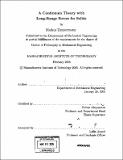A continuum theory with long-range forces for solids
Author(s)
Zimmermann, Markus, 1976-
DownloadFull printable version (8.270Mb)
Other Contributors
Massachusetts Institute of Technology. Dept. of Mechanical Engineering.
Advisor
Rohan Abeyaratne.
Terms of use
Metadata
Show full item recordAbstract
A non-local integral-type continuum theory, introduced by Silling [61] as peridynamic theory, is analyzed. The theory differs from classical (local) continuum theories in that it involves long-range forces that act between continuum particles. In contrast to existing non-local theories, surface tractions are excluded. As consequence, the theory is applicable off and on defects and interfaces: cracks and phase boundaries are a natural part of the body, and do not require special treatment. Furthermore, as the model loses "local stiffness", the resistance to the formation of discontinuities is reduced. The theory can be viewed in two ways: It is a multi-scale model in that it can be applied simultaneously on the atomistic level and on the macroscopic level with a smooth interface between the two regimes. Alternatively, it can be used as a purely phenomenological macroscopic model that still works off and on defects. Forces of microscopic range may represent the interaction of an underlying microstructure such as discrete particles. Forces of macroscopic range are not necessarily physical and are justified by their effective behavior. A meshless numerical approximation technique is implemented for the macroscopic model and used to simulate brittle fracture. If the internal length of the simulated peridynamic body is small compared to its macroscopic dimensions, then the simulation results agree well with linear elastic fracture mechanics. In contrast to classical fracture mechanics, however, the crack path does not need to be known in advance.
Description
Thesis (Ph. D.)--Massachusetts Institute of Technology, Dept. of Mechanical Engineering, 2005. Includes bibliographical references (p. 173-179).
Date issued
2005Department
Massachusetts Institute of Technology. Department of Mechanical EngineeringPublisher
Massachusetts Institute of Technology
Keywords
Mechanical Engineering.